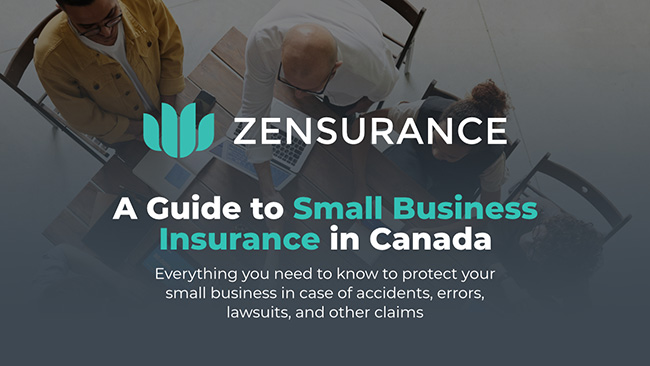Are you enthusiastic about education and an excellent communicator? Do you enjoy steering others toward a better understanding of complex concepts? Are you open-minded and adaptable?
You can check all of the above and add deep reserves of patience, requisite time-management skills, and a dash of creativity. In that case, you may have the potential to be a successful tutor.
You have been tutoring already for several years and consider yourself a specialist in several subjects. See below for tips on what you need to know to put your skills to the test and start your own tutoring business in Canada. And, importantly, to learn more about tutor insurance to protect your assets and reputation.

Download Our FREE Insurance Guide
Learn everything you need to protect your small business.
Whitepaper download
"*" indicates required fields
Your email address will be used by Zensurance to provide latest news, offers and tips.
You can unsubscribe at any time.

What Is a Private Tutor?
Rather meaningfully, the word ‘tutor’ comes from the Latin tūtor, meaning to guard or defend.
The idea of protection is integral to the term. There is evidence to show it referred to a private teacher, usually one who teaches the younger generations individually or in small groups, as early as the 13th century.
Today, tutoring is commonly known as a private and supplementary method of academic instruction and support. The expectation is that the tutor has exhaustive knowledge or demonstrated expertise in their subjects of focus.
What Does a Tutor Do?
As mentioned above, a tutor can play an invaluable role in a student’s learning. In addition to being the competent and accessible instructor that brings persistence and in-depth knowledge to the table, you’ll also find yourself doing these more concrete functions:
- Assess the student’s skills and knowledge and help set achievement and improvement goals.
- Teach and review the subject lessons and class topics.
- Assist the student with assignments (homework, research, presentations, papers, and tests).
- Provide study guides, strategies, and alternative sources for further study.
- Evaluate and grade students’ work.
- Monitor all of the above and assess progress and areas that need improvement.
- Impart feedback to the student (and their parent or guardian if applicable).
A working tutor should stay abreast of any developments in their areas of expertise.
What Types of Tutors Are There?
Tutors come in all shapes and sizes and settings, but you will find that they mostly fall into one of the following types:
- Academic tutor. Coaching is a significant element here. Think of a mentor that helps the student learn the course material but also helps them succeed in the other aspects of schooling (time management, study skills and techniques, test preparation, and note-taking).
- Private tutor (at a tutoring centre, home, or online). One-on-one tutoring focused on one student and usually on a specific academic subject or exam preparation. COVID-19 taught us that location is a state of mind.
- Group tutoring (at a tutoring centre, home, or online). Similar to private tutoring except, instead of on behalf of an individual, for a small group.
Tutors can choose to focus on specific subjects, especially given the popularity of the following subjects:
- Math tutor. Students often seek one-on-one tutoring in math. Understanding the foundational concepts (elementary math such as algebra and geometry, as well as calculus and trigonometry) allows students to build upon them as it becomes more abstract and advanced (logic, number theory, statistics, and other advanced mathematics courses).
- Science tutor. The sciences are an element of everyday life. Understanding them can help develop essential skills such as logic, critical thinking, problem-solving, and reasoning. And because the physical sciences are mandatory in many stages of education, students often seek help in subjects such as physics, chemistry, and earth sciences.
- English tutor (English classes and English as a Second Language, aka ESL). English literacy is necessary beyond effective communication. Understanding English is essential for numerous reasons. Foremost among them is that globalization has pushed English to the forefront as the language of business, with one in four people worldwide speaking English at an advanced level.
- Languages tutor. Canadians are primarily English-speaking. And while Canada is officially bilingual, its multiculturalism means that in addition to French, other languages, including Mandarin Chinese and Spanish, are sought after for tutoring.
You can be a tutor at the elementary, secondary, and post-secondary levels and for specific academic and non-academic subjects, including languages or coding.
What Is the Difference Between a Private Tutor and a Teacher?
Private tutors and teachers support students in their education and the potential challenges and goals of learning. Still, there are key differences to keep in mind if opening a tutoring business is your aim.
The most considerable difference between private tutors and teachers is the qualifications. Teachers have degrees, typically in education, and must hold a valid provincial teaching certificate. However, there are rarely any specific qualifications required to work as a tutor.
The other differences boil down to preferences. For example, if you prefer more flexibility with your schedule, you can make your appointments and have autonomy on when and where you work.
Teachers are tied to the school calendar, with little wiggle room. And tutoring is a direct and personalized approach, while teachers, on the other hand, must communicate the same lesson to groups of 20 or more.
What Are the Benefits of Starting a Tutoring Business?
To recap some of the advantages already mentioned, running your own tutoring business gives you the latitude to shape your work to fit your unique needs. You can work part-time or full-time, year-round or only during the academic calendar. And you can be employed by a school, tutoring centre or agency or work as a self-employed tutor.
And there are so many other benefits to starting a tutoring business, especially if it is your passion. It’s also a way to hone your teaching skills, continue learning, achieve your goals, impact the community, and earn income.
Furthermore, it is remarkably affordable and clear-cut, with low upfront and overhead costs. You can have it all on your terms if you are your own boss.
Is There a Demand for Private Tutors in Canada?
Let’s take a quick test. Is there a demand for private tutors in Canada? If you answered “yes,” good work, you aced this pop quiz!
The Global Private Tutoring Industry market report from October 2022 states that the private tutoring market in Canada is forecast to grow at 6.8% between 2020 and 2027.
The booming rise in private tutoring is correlated with population growth, driven by an increased student population and competition. There is also an uptick in adult learning and the development of distance learning opportunities. Innovations in the high-tech, manufacturing, and medical sectors demand further certification courses, reinforcing the appetite for tutoring services.
The acute detour to online learning in the past few years has been disruptive for students. Learning amongst such discord is challenging, and some students have lost ground without the constancy of traditional schooling.
For an Oxford Learning Centre, the most considerable increase in demand was for “kids in grades 2 to 4 who were struggling with reading, and high-school students in grades 10 and 11 who found math challenging.”
How Much Money Can a Tutoring Business Make?
Private tutors usually earn an hourly wage. As of December 2022, the average of over 35,000 tutoring salaries shared on Indeed.ca, the average salary for a tutor is $30.98 per hour in Canada.
As with anything in Canada, there is a wide variance of averages based on your location. The highest-paying city for tutors in Canada is Ottawa, at almost $31 per hour. Other top cities include Toronto ($29.80 per hour) and its surrounding suburbs, including Oakville ($29.72 per hour) and Richmond Hill ($28.43 per hour). Other lucrative cities are Vancouver ($24.47 per hour) and Calgary ($20.74 per hour).
Do You Need a Licence to Start a Tutoring Business?
While all businesses need to obtain the proper licences, permits and inspections before opening or operating, no legal requirements prevent you from becoming a tutor.
For example, say you plan to operate your tutoring business in Toronto. You will be subject to municipal requirements (zoning requirements and sign permits if applicable), provincial requirements (business registration), and federal requirements (harmonized sales tax). You may also require a Criminal Record Check if you plan to teach young children in Canada.
A helpful tool for all the nitty-gritty of permits and licences is BizPal. Provided by federal, provincial/territorial, municipal governments, and First Nations, it helps you find out what permits and licences you need for your business based on your location.
What Steps Do I Take to Start a Tutoring Business?
Once you trust you have the appropriate skills for your planned area of focus, take the following simple steps congruous with any clever business plan:
- Determine your niche. Define the subjects you will tutor, the students you want to teach, the approach you plan to take, and the fees you will charge, all based on unbiased market research and some shrewd competitor analysis.
- Set up your business with all the appropriate paperwork (legal, regulatory, and financial).
- Prepare course materials.
- Find your students by promoting your business (see below for tips).
How Do I Promote My Tutoring Business?
Even if your marketing budget is nonexistent, always have a strategy to promote your tutoring business.
Start by taking advantage of your mostly unpaid organic channels (website, blog, newsletter, and social media accounts). An outstanding mobile-first website is a no-brainer. Create content to post as blogs and encourage sign-ups to your newsletter.
Use search engine optimization (SEO) to make it easier for potential clients to learn about you, contact you, and even book sessions. Continuously incorporate any positive client testimonials you receive. List your business as a Google Business profile, and on other directories, including Yelp, Nextdoor, and Yellow Pages.
As your revenue grows, layer in paid channels. Use Google and social media ads that allow you to set a cap on your spending and zoom in on a specific geography or target market. Your social media marketing strategy should include at least the primary platforms (Facebook, Twitter, Instagram, and LinkedIn) to create a solid offline and online presence and allow contact and interaction. Relevant and consistent social media that demonstrates your expertise should keep your current clients engaged. The algorithms favour the engagements of your followers, which in turn amplifies your reach. Drive new business by joining forums and groups related to education and training to hype your services.
When you expand your marketing budget, think about investing more in the channels that have been successful so far. If you can justify a return on investment, consider printing brochures, buying newspaper ads, or some well-located out-of-home advertising (signage and billboards).
What Insurance Does a Tutor Need?
As a provider of professional tutoring services, you should consider getting tutor insurance — a specialized policy package to protect the needs of tutors and tutoring businesses. There are plenty of reasons why both tutors and teachers need insurance.
A comprehensive tutor insurance policy covers your business for general and specific liability claims, among other things. This type of policy generally includes the following:
- Professional Liability Insurance. It’s also known as errors and omissions (E&O) insurance. It aims to protect tutors against lawsuits alleging failure to deliver a service as promised and even negligence or misconduct.
- Commercial General Liability (CGL) Insurance. CGL protects your business from third-party injury and property damage claims that may occur.
- Cyber Liability Insurance. Cyber coverage protects your business against the costs of containment, recovery, and repair expenses when cybercrimes breach your systems.
- Legal Expense Insurance. A necessary coverage to add to your policy. It can make all the difference for a self-employed small business owner whose only alternative may be debt if funds are needed for legal advice and representation.
There may be other coverages your policy needs, such as commercial property insurance if you travel to various locations with electronic devices like a laptop to do your job.
With Zensurance, you get access to a range of quotes for free with the necessary coverages at great prices. Our licensed insurance brokers can help you decide which coverage is best for you.
– Reviewed by Shelly Petrie, Team Lead, Digital Solutions Team, Zensurance.
Sign Up for ZenMail
"*" indicates required fields
Recent Posts
10 Tips for Closing Your Small Business for the Winter
Are you closing up shop for the winter? Ensuring your property is prepared for winter and your valuable contents and inventory are safely stored is vital. See our tips for how small business owners can shut down operations and keep their assets safe.
9 Ways to Celebrate Small Business Saturday in Canada
Take advantage of Small Business Saturday to raise brand awareness and attract new customers as the holiday shopping season heats up. See our list of how you can do that cost-effectively.
10 Insurance Tips for Women Entrepreneurs
Navigating the complexities of acquiring the right type of liability insurance can be daunting for any entrepreneur in any industry. See our insurance tips for helping women-owned businesses and startups make informed decisions.








